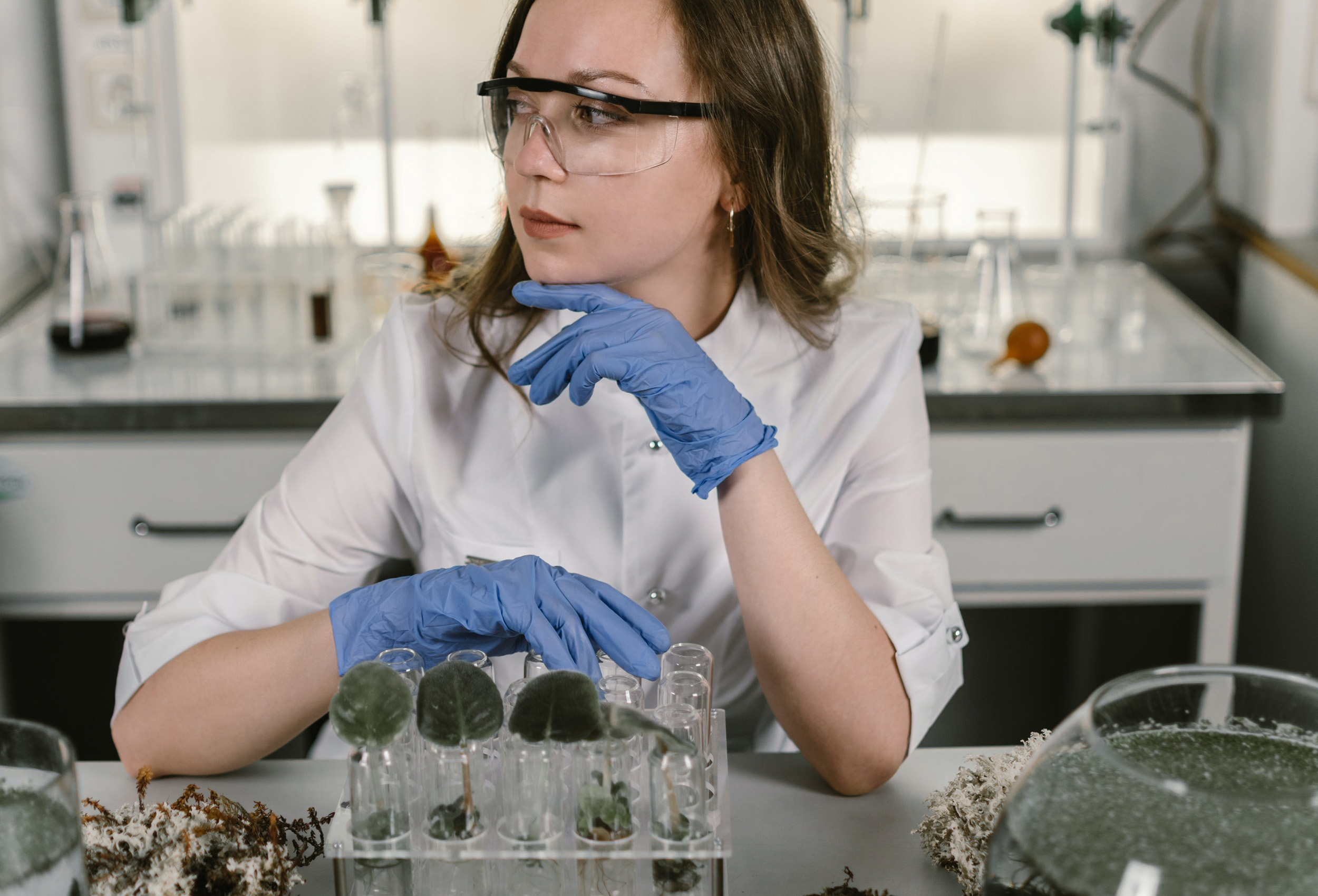Did you know that our bodies are made up of over 10 trillion cells, each with its own unique composition and functions? Have you ever wondered how this complex system operates? Enter the world of biochemistry, a field dedicated to understanding the chemical processes that occur within living organisms. Biochemists play a crucial role in unravelling the mysteries of life by studying biological molecules, such as DNA, proteins, and carbohydrates, and how they interact with each other. In this blog post, we’ll delve into the fascinating world of biochemistry and explore what makes it an exciting and essential area of scientific research for understanding our bodies’ inner workings. Whether you’re curious about pursuing a career in biochemistry or simply interested in learning more about this discipline, read on to discover all there is to know about what biochemists do.
Introduction to Biochemistry and Its Importance in Our Daily Lives
Biochemistry is the study of the chemical processes and substances that occur within living organisms. It is an incredibly important field of study that has vast implications for our daily lives. For example, biochemistry helps us understand the way that our bodies work, including how we digest food and fight off diseases. It also helps us develop new medicines and treatments for illnesses. Beyond healthcare, biochemistry has applications in many other areas, including agriculture, energy production, and even environmental science. Overall, biochemistry plays a crucial role in our understanding of the natural world and in improving our quality of life.
What is a Biochemist and what do They do?
Biochemists are scientists who study the chemical processes that take place within living organisms. They work in a variety of settings including health care, research, and academia. Their goal is to understand how biological systems function on a molecular level and to apply this knowledge to develop new treatments for diseases and improve human health. Biochemists use techniques like genetics, protein chemistry, and spectroscopy to investigate the structure and function of biological molecules. They also play an important role in the development of new drugs and therapies, working with doctors and other medical professionals to translate their findings into practical applications. Overall, biochemists are essential to our understanding of life itself and the many processes that keep us healthy and thriving.
Role of Biochemists in Healthcare: Drug Development, Disease Diagnosis and Treatment
Biochemists play a crucial role in the field of healthcare, contributing to drug development, disease diagnosis, and treatment. By investigating the chemical processes occurring within living organisms, biochemists can develop and test new drugs, ensuring their safety and effectiveness before they are presented to the public. Additionally, biochemists use their knowledge to identify particular chemical markers that are indicative of certain diseases, allowing for earlier diagnosis and thus, more effective treatment. By combining their understanding of chemistry and biology, biochemists help to advance the field of healthcare by providing the necessary advancements in drug development, disease diagnosis, and treatment.
Impact of Biochemistry on the Environment and Sustainability Efforts
Biochemistry, the study of chemical processes within living organisms, has a significant impact on the environment and ongoing sustainability efforts. Advancements in biochemistry have led to the development of various sustainable practices that play a crucial role in preserving our planet. From renewable energy sources such as biofuels to biodegradable plastics, biochemistry has provided solutions that are environmentally friendly. Additionally, biochemistry is critical to the understanding of the impacts of pollution on the environment and the development of new techniques to mitigate its effects. The future of the environment lies in embracing and utilizing innovations in biochemistry to create a sustainable and healthy planet for generations to come.
Examples of Famous Discoveries Made by Biochemists
Biochemistry has paved the way for numerous amazing discoveries over the years. Some of the most famous ones include Watson and Crick’s discovery of the structure of DNA, which revolutionised molecular biology and genetics. Another important discovery was the identification of insulin by Frederick Banting and Charles Best, which has helped millions of people with diabetes manage their condition. Biochemists also played a key role in the development of penicillin, one of the most widely used antibiotics in the world. These are just a few examples of the many contributions that biochemists have made to science and medicine, and their work continues to shape our understanding of the natural world.
Antibody conjugation companies are steadily entering the therapeutic mainstream, especially for oncology and haematology applications. There are still just seven FDA-approved ADCs on the market, but 80 ADC candidates are now under evaluation in around 600 pre-clinical and clinical trials.
Common Techniques used by Biochemists: Chromatography, Spectrophotometry, etc.
Biochemists employ a range of techniques to study the molecular structures and processes of living organisms. One of these techniques is chromatography, which separates components of a complex mixture by exploiting differences in their chemical properties. Another commonly used method is spectrophotometry, which measures the absorption or emission of light by molecules in a sample. These and other techniques, such as electrophoresis and mass spectrometry enable biochemists to investigate the properties and functions of biomolecules such as proteins, nucleic acids, and lipids, leading to a deeper understanding of the biochemical processes that underpin life.
Education and Career Paths for Aspiring Biochemists
Biochemistry is a fascinating field that combines biology and chemistry to explain the chemical processes in living organisms. Aspiring biochemists have a range of education and career paths to consider in order to pursue their passion. For those interested in academia, a PhD is typically required, and pursuing research opportunities in academia can lead to tenure-track faculty positions. However, there are also industry opportunities available, such as working for pharmaceutical companies or biotech firms. Another route for biochemists is to pursue a career in medicine, where they can use their understanding of the chemical processes in the human body to diagnose and treat diseases. Regardless of the path chosen, a biochemistry education provides a solid foundation for a rewarding career in a variety of industries.
Challenges Faced by Biochemists and Ongoing Research in the Field
Biochemists face various challenges in their research, such as complex biological networks and the difficulty of accurately replicating natural systems in a laboratory setting. Despite these obstacles, ongoing research in the field strives to unravel the intricate workings of living organisms at a molecular level, with the aim of discovering novel therapeutic targets. For example, researchers are investigating the role of protein degradation pathways in diseases such as cancer and Alzheimer’s as a potential avenue for drug development. Additionally, advances in technology, such as single-molecule imaging and gene editing tools, are pushing the boundaries of what is possible in biochemistry research. As biochemists continue to push the frontiers of scientific knowledge, new discoveries and breakthroughs in this field will undoubtedly continue to benefit society in countless ways.
Biochemistry in Popular Culture: Movies, TV shows, and Books
Biochemistry is a fascinating field of science that has made its way into popular culture in movies, TV shows, and books. Whether it’s the depiction of a scientist creating a potion or a pharmaceutical industry using biochemistry in their research, the entertainment industry has successfully incorporated biochemistry into its storylines. Take for example, the TV show ‘Breaking Bad,’ where the main character, Walter White, uses his knowledge of biochemistry to cook and sell methamphetamine. Though the depiction of the drug trade is bleak, it highlights the significance of biochemistry in making methamphetamine. Similarly, in the movie ‘Limitless,’ the protagonist uses a bio-engineered drug called NZT-48 which enhances his cognitive abilities, allowing him to become an Ivy League graduate and a successful author. It’s fascinating to see how biochemistry can be used creatively in popular media to capture our imagination and teach us something new.
Biochemistry has been shown to have a significant impact in various fields of study, ranging from health care to environmental science. In health care, biochemists play an essential role in discovering new drugs and treatments for various diseases by studying the biochemical processes within the body. In agriculture, biochemistry is vital in understanding plant growth and development, leading to the development of efficient and sustainable farming practices. Environmental scientists also use biochemistry to explore ways to reduce pollution and promote clean energy production. Additionally, biochemistry is applied in food science and biotechnology, helping to enhance and preserve food quality and production. The diverse applications of biochemistry highlight its critical role in shaping modern society, making it a fascinating field of study with endless possibilities.
Conclusion
Biochemistry is a fascinating field that encompasses a range of scientific disciplines and has countless applications in our daily lives. From developing life-saving drugs to understanding and preserving our environment, biochemistry plays a crucial role in shaping the world around us. We have explored the role of biochemists in healthcare and how their work impacts the quality of human life. We have also seen famous discoveries made by biochemists, highlighting their contribution to scientific advancements. Additionally, we have delved into common techniques used by biochemists and touched upon the education and career paths for those interested in pursuing this field. Despite the challenges faced by biochemists, ongoing research in this ever-evolving field continues to bring forth exciting findings that have the potential to change our world for the better. And let’s not forget about its presence in popular culture, with numerous movies, TV shows, and books featuring characters who are biochemists or incorporate biochemistry themes. As we draw this blog post to a close, I invite you to take a moment to reflect on the diverse applications of biochemistry and appreciate its impact on our global society. It is clear that the possibilities for discovery and innovation within this field are endless, making it an intriguing path for those with a passion for science. So why not consider becoming a part of this dynamic community as we continue to unravel the mysteries of life through the lens of biochemistry? After all, as Albert Einstein said, “The more I learn, the more I realize how much I don’t know.” Let’s keep pushing boundaries and unlocking new knowledge through this incredible field!

